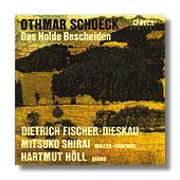
The Internet's Premier Classical Music Source
Related Links
- Latest Reviews
- More Reviews
-
By Composer
-
Collections
DVD & Blu-ray
Books
Concert Reviews
Articles/Interviews
Software
Audio
Search Amazon
Recommended Links
Site News
 CD Review
CD Review
Othmar Schoeck

Das holde Bescheiden, Op. 62
Dietrich Fischer-Dieskau, baritone
Mitsuko Shirai, mezzo-soprano
Hartmut Höll, piano
Claves CD 50-9308/9 (2CDs) DDD 110:18
Since Claves is Switzerland's most important record company and Othmar Schoeck the most important Swiss composer, their steady devotion to his music seems entirely logical. Now the Claves survey of his output reaches Das holde Bescheiden, the thirteenth and longest of his fifteen song-cycles. Composed between 1947 and 1949 in the last decade of Schoeck's life, Das holde Bescheiden comprises no fewer than forty Mörike settings for low voice and piano, some of them brief miniatures under a minute in length and the last, "Besuch in Urach", a full quarter-hour (Schoeck later acknowledged its importance by orchestrating it). Schoeck had tackled Mörike earlier in his career (in 1907, 1909 and on three further occasions between 1931 and 1943), but this was his first extensive attempt to set him to music. There were two main reasons for his caution: the first was a respect for Wolf's Mörike settings, which he gradually came to feel didn't do the poet full justice; the second was that Schoeck abhorred what he once called "pouring music" onto a text and preferred to wait until the poetry spoke directly enough to him to stimulate a fitting musical response. The previous masters of Lieder-composition had been circumspect indeed in their approach to Mörike and, before Schoeck, only Wolf and Distler (in choral settings) had tackled his poetry on any scale.
In his classic 1961 book The Songs of Hugo Wolf, Eric Sams wrote that Mörike's "best poems have a quiet, seemingly passive, quality", ascribing it to their "Imagination, religious devotion, realism and humour in the content of the poems, folk-song and classical tradition in their forms". Sams went on to put his finger on what must have attracted Schoeck to Mörike: "There is indeed a quiet radiance about Mörike's poetry, as if it were in a state of grace". All these elements are reflected in Schoeck's music, although the characteristic most frequently felt throughout the cycle is the untranslatable "holde Bescheiden" of the title. Claves' booklet suggests an inaccurate "The Just Measure", and Derek Puffett's 1981 study, The Song Cycles of Othmar Schoeck, offers a closer "sweet acceptance"; the meaning is closer to a sort of "unassuming resignation", but that doesn't fully capture the gentle redolence of Mörike's expression either.
Das holde Bescheiden opens with a single song, entitled "Dedication" and closes with the expansive "Visit in Urach"; the settings they enclose are grouped in four sections, entitled "Nature", "Liebe", "Observation" and "Belief". Schoeck's conservative lyrical style allows him to concentrate on reflecting the meanings evoked by Mörike's subtlely shaded imagery: he's not out to prove anything for himself but to put his entire compositorial craft at the service of the poetry. And those texts call for evocations of nature and of folksong, lovesongs, the quirkily humorous and the spiritual, the comforting and the unsettling; they range from the contemplation of God to a delightful four-line tribute to a dog. But although Schoeck often allows himself considerable scope for gentle humour, his expression of stronger emotion, at least in the vocal part, is never direct: feeling here is veiled, remembered, suggested; at best the piano writing is allowed to allude to the emotions expressed in the words. The singer is more, well, bescheiden. This reserve gives Schoeck's music a tender suggestiveness that a more overt approach might have missed; while that may mean it is rarely overtly beautiful, it is often wonderfully evocative.
It goes without saying that Fischer-Dieskau's response to the text is deeply imaginative and his diction clear to the comma. His voice these days isn't what it was, of course, and once or twice in forte passages he manages to produce the odd ugly note (you'll hear what I mean in "Auf der Teck"), but this is to judge him by standards that he has set himself. Otherwise, he brings deep insight and profound understanding to the music, investing it with a huge range of emotions. Mitsuko Shirai has also established herself as one of the leading living Lieder singers, and she sets standards here that few others will meet (so I wonder why she didn't insist on a retake of the second part of "Erinna an Sappho", where her voice is hard, almost unpleasant). Hartmut Höll excels himself in the piano part.
Claves provides full texts, but in German only. An understanding of the texts is so important here that the absence of translations is a serious fault, for your German will have to be pretty good to follow all the subtleties of Mörike's verse. Even approximative prose translations would have helped. For enthusiasts of the Lieder tradition srongly recommended nonetheless.
Copyright © 1996/1998, Martin Anderson


















